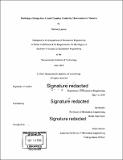Realizing a design for a cloud chamber cooled by thermoelectric modules
Author(s)
Larson, Michael (Michael K.), S.B. Massachusetts Institute of Technology
DownloadFull printable version (2.913Mb)
Other Contributors
Massachusetts Institute of Technology. Department of Mechanical Engineering.
Advisor
Ian Hunter.
Terms of use
Metadata
Show full item recordAbstract
A cloud chamber consists of a super-saturated vapor inside a sealed chamber which forms visible trails of mist when radiation particles are emitted from a nearby source. Such behavior can be used to supplement the teaching of entry-level physics students, as the cloud chamber provides a visual demonstration for phenomena which otherwise might remain somewhat abstract, such as Lorentz Force Law. However, most cloud chambers require the use of material such as dry ice to induce surface temperatures below -26° C. Cooling a surface below this threshold enables the formation of super-saturated vapors of fluids such as isopropyl alcohol, which is used in this experiment. In order to address the problems with space, storage, and flexibility that typically exist with cloud chambers, this thesis explores the use of thermoelectric coolers (TECs) instead of dry ice to create the temperature difference needed to visualize radiation particles. The TECs, which are cooled by a Liqmax II 120S liquid CPU cooler, interface with a copper plate on which isopropyl alcohol forms a super-saturated vapor. A 3D printed plate houses the TECs and copper plate, and supports an acrylic covering which seals the chamber. Using a multi-stage TEC module, the copper plate reaches a temperature of -40° C within two minutes of being powered. The visibility of radiation in the super-saturated region was observed using three materials: Polonium-210, Lead-2 10, and Strontium-90. The cloud chamber can be improved and further work is discussed.
Description
Thesis: S.B., Massachusetts Institute of Technology, Department of Mechanical Engineering, 2018. Cataloged from PDF version of thesis. Includes bibliographical references.
Date issued
2018Department
Massachusetts Institute of Technology. Department of Mechanical EngineeringPublisher
Massachusetts Institute of Technology
Keywords
Mechanical Engineering.